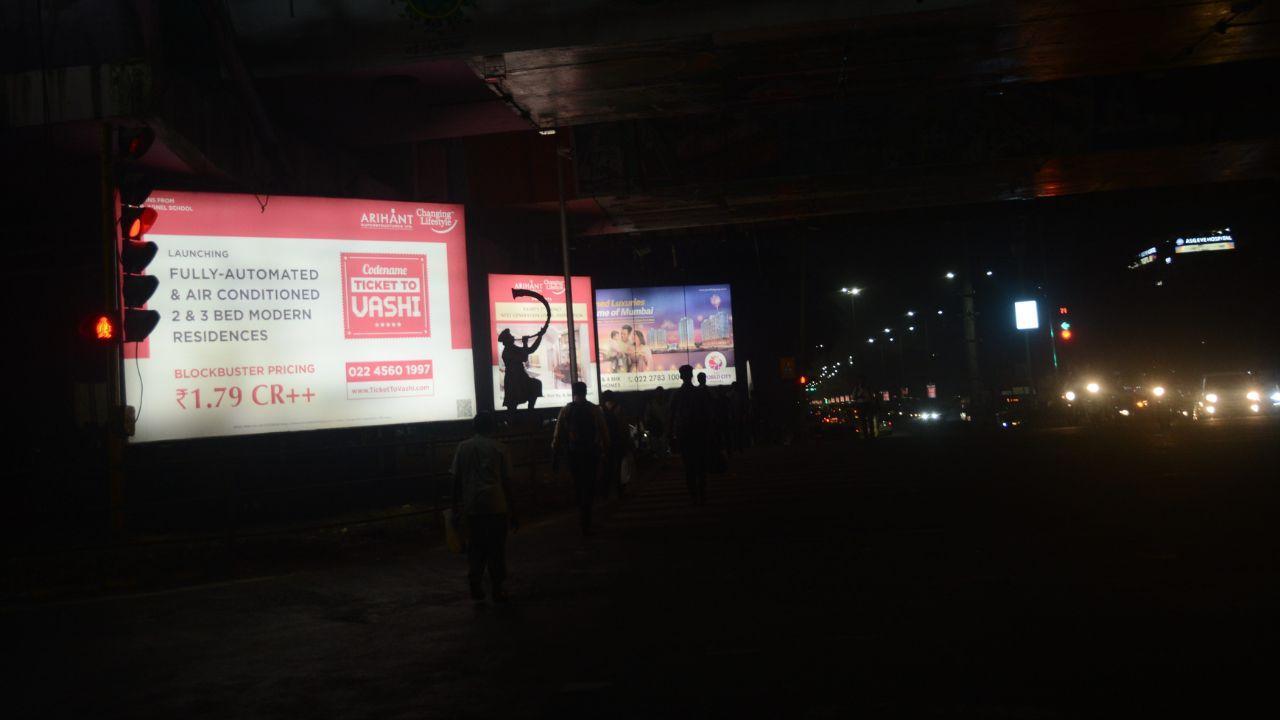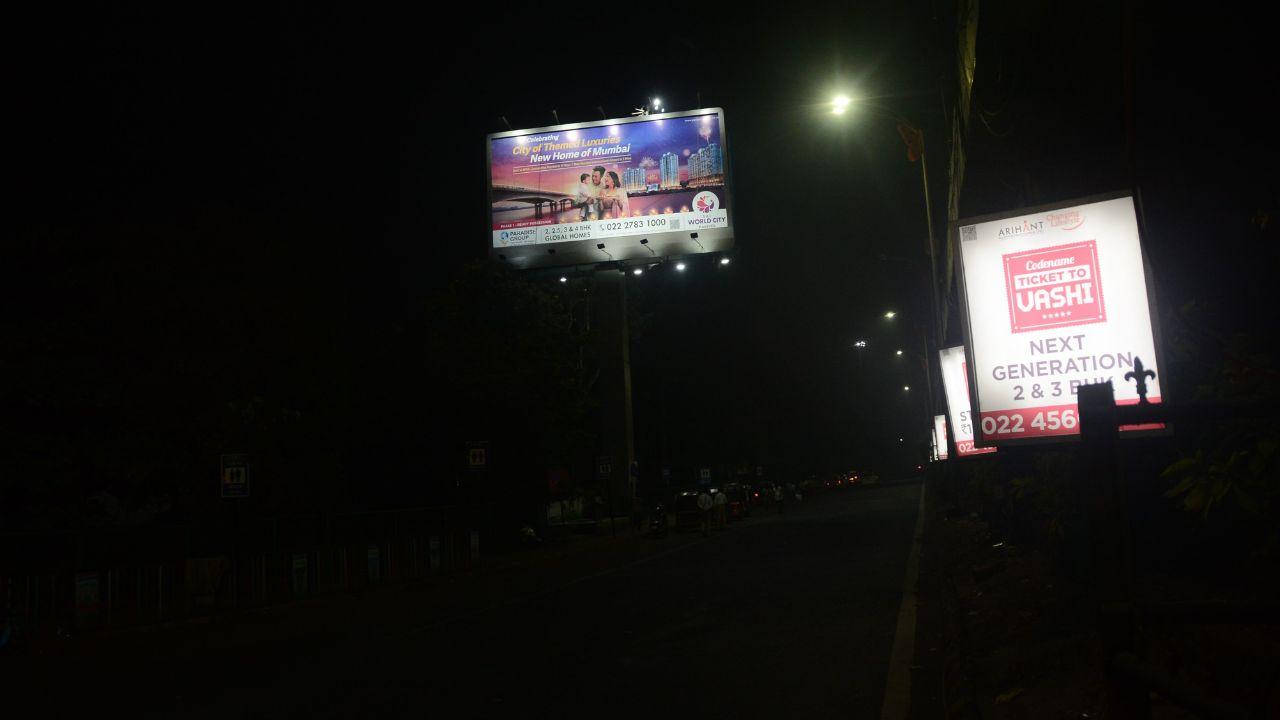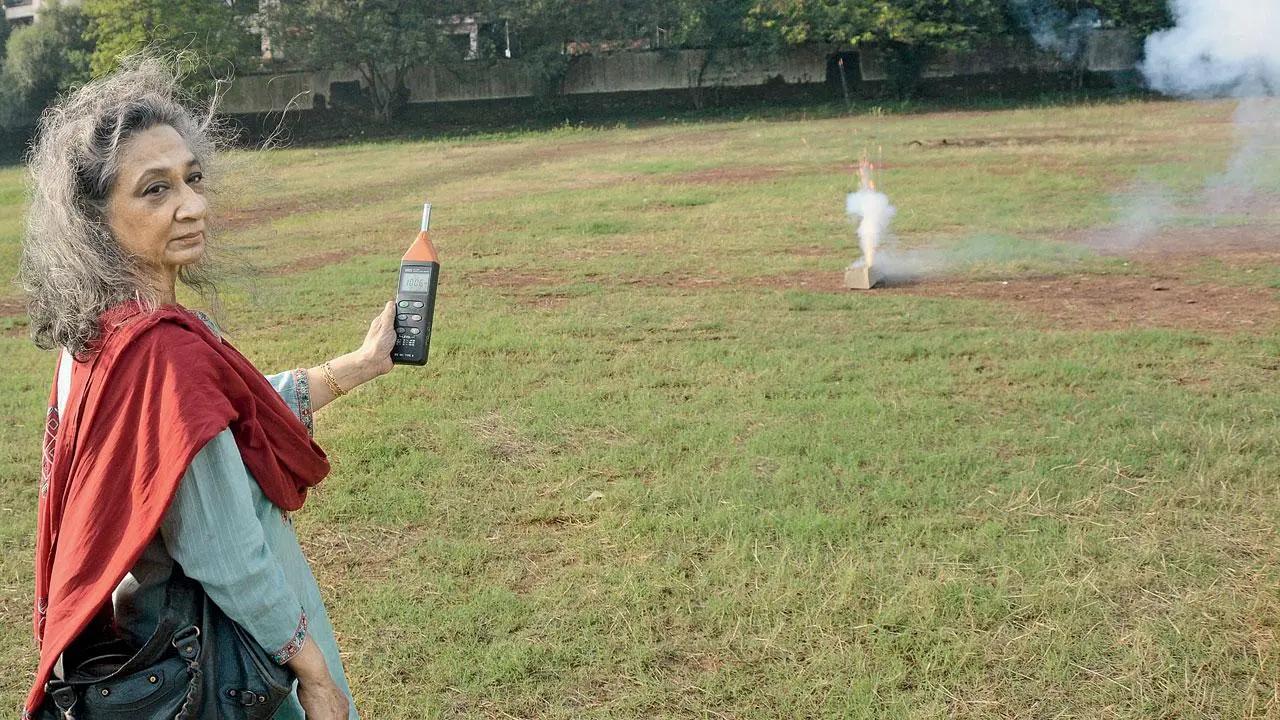Awaaz Foundation requests BMC to come out with stronger draft policy on outdoor advertisements

LED hoarding on the Vashi Highway/Sayyed Sameer Abedi
The Awaaz Foundation, an NGO, has raised objections to the Brihanmumbai Municipal Corporation’s Draft Policy Guidelines for Outdoor Advertisements, 2024. It called for a stronger draft policy, which includes setting an illuminance limit for digital hoardings, making reports and recommendations of the BMC-appointed committee public and ensuring regular monitoring of the same.
The group has also urged the BMC to conduct a public hearing on the matter.
The Awaaz Foundation argues that the policy lacks a scientific basis for its provisions on light pollution—a concern it believes could negatively impact human health and increase road safety risks. The group has suggested that the policy should address crucial factors such as climate, health and safety, and has requested additional public and expert consultations.
 LED hoarding on the Vashi Highway/Sayyed Sameer Abedi
LED hoarding on the Vashi Highway/Sayyed Sameer Abedi
The draft policy aims to regulate various forms of outdoor advertising, including digital and lighted signs across private and public sectors. However, the Awaaz Foundation highlighted the absence of scientific study on the policy’s potential impacts on light pollution, which could have far-reaching effects on both human health and road safety.
The BMC had called for public suggestions and objections regarding the draft policy, with the deadline set for 5 pm on August 26.
Alleged omissions
In its submission to the BMC, the foundation argued that the proposed guidelines lack sufficient restrictions on illumination levels, colour scales and the use of video displays. These omissions, it claimed, could exacerbate light pollution, known to disrupt sleep patterns, increase stress and even heighten risks of road accidents due to glare affecting drivers’ concentration.
The advocacy group has called for a personal hearing and a public consultation to allow affected citizens to present detailed submissions. It has also requested an extension of the deadline for public comments to ensure thorough community engagement and expert review.
The foundation urged the BMC to incorporate international practices like setting maximum illumination limits and restricting animated content on digital displays. The policy, it suggested, should also include adaptive brightness controls to mitigate light pollution and define specific zones where advertising is permissible, taking into consideration residents’ feedback.
“In most countries, city lighting is regulated, particularly in residential areas and on motorable roads. The lighted billboards of the Ginza in Tokyo and the Times Square of New York are restricted to commercial areas. Even New York City, famous for its bright billboards and nightlife, has recognised the harmful impacts of light pollution and, in 2021, passed laws against it by restricting all non-essential lighting during nighttime hours. In NYC, stricter laws are also under review,” stated the letter by Awaaz Foundation.
 Sumaira Abdulali/ File Photo
Sumaira Abdulali/ File Photo
The group emphasised the importance of aligning the policy with broader governmental objectives of enhancing public welfare and environmental protection.
Health impact
The letter further stated, “Humans follow regular sleep patterns of day and night due to regulation of hormones, especially melatonin which promotes sleep in the absence of light. Similar to noise pollution, the adverse effects of light pollution include lack of sleep, disturbance of sleep patterns, irritation, stress, eye strain and other serious health issues. Certain colours on the spectrum are even more comparatively harmful than others, in particular blue light, which makes up one-third of all visible light, and which can even cause eye cancer.”
“Light pollution, apart from detrimental impacts on road safety and human health is also detrimental to the environment, biodiversity and wildlife. For example, certain types of plants do not flourish if regular day/night patterns of light are disrupted. Birds and animals are disturbed by excessive lighting. Indian National Parks recognise the adverse effects of light pollution on wildlife: at night, lights from vehicles and all other forms of light are strictly regulated in National Parks,” it read.
The letter further read, “The stated aim of the draft policy is to offer 'world-class advertising tools and services in the outdoor media’. In accordance with this aim, and with other aims of the Maharashtra government, the Awaaz Foundation requests the draft policy be accountable to the adverse effects on safety, health and the environment of unrestricted light pollution. Therefore, we request that the BMC incorporate guidelines similar to many global cities.”
Scientific panel
Sumaira Abdulali, founder and convenor of Awaaz Foundation, told mid-day: “We proposed the formation of a scientific committee to address this issue. However, we have learned that such a committee already exists. We demanded that their recommendations or reports, if submitted, be made public. We've also heard that the committee includes three experts from IIT, which is commendable. However, it's crucial that the committee also include representatives from the public, NGOs and medical professionals. If such a committee is already in place, the BMC should disclose its details.”
In 2017, Abdulali raised concerns about harshly coloured LED lights installed at Juhu beach.
She pointed out, “Unlike air, noise and water pollution, people often do not consider light pollution a significant issue or an issue at all. Sadly, there are no existing laws or guidelines to regulate light pollution. Light pollution can be distracting for drivers and motorists and disrupt people’s sleep patterns. Hence, the civic body needs to include stringent regulations pertaining to the same and also set a maximum illuminance limit for digital hoardings.”
The BMC has yet to respond to the foundation’s requests.
BMC's Draft Policy on Outdoor Advertisements
The policy updating guidelines from 2008. The revision was prompted by the billboard collapse in Pant Nagar, Ghatkopar, on May 13, leading to 17 fatalities.
Key guidelines:
General provisions: The policy addresses both traditional and digital outdoor advertising, updating terms for previously approved billboards.
Safety and aesthetics: The main objectives are to enhance safety, minimise visual clutter and maintain the aesthetic integrity of the city.
Digital advertisements: Digital billboards will have a minimum static image display time of eight seconds. The use of video on digital billboards and gantries is prohibited.
Content restrictions: Content deemed offensive, obscene or distracting is banned under Sections 328 & 328(A) of the MMC Act, 1888.
Additional policy details
Structural stability: Implementation of a standard operating procedure to ensure the structural integrity of hoardings.
Renewal of permit: Permits must be renewed at least three months before expiration.
Proximity restrictions: Billboards are not to be erected near high-tension power lines.
Political advertising: Specific provisions are included for political advertising during election periods, adhering to the established electoral code of conduct.
Digital advertising opportunities: Digital LED advertising is permitted for malls, multiplexes and commercial buildings.
Required approvals: A no-objection certificate from the joint commissioner of police (traffic) is mandatory for illuminated or digital billboards.
Enforcement: Frequent violations or failure to pay fees can lead to advertisers or permit holders being blacklisted.
BMC premises advertising: Advertising opportunities on BMC premises will be managed through e-tendering.
Public utilities: Advertising is allowed in exchange for the operation and maintenance of public utilities.
Financial guarantee: A bank guarantee equivalent to six months of license fees is required from advertisers.
Impact of light pollution on the ecosystem
Scientists worldwide say that people’s sleep could be impaired as a result of artificial lights, which could be detrimental to human health and well-being.
Light pollution directly contributes to the decline of many insect species. As per Buglife - The Invertebrate Conservation Trust, a Europe-based organisation dedicated to conservation, education and policy change to protect insects, artificial light affects mating, feeding, navigation and development.
According to DarkSky International, a group of 2,000+ volunteer advocates around the world, light pollution affects migratory birds by disrupting their natural movement patterns or causing them to mate too early, leading to declining populations. Artificial light can cause nocturnal birds to wander off course.
2021
Year law was passed against non-essential lighting at night in New York
‘Light pollution can be distracting for drivers and motorists and disrupt people’s sleep patterns. Hence, the civic body needs to include stringent regulations pertaining to the same and also set a maximum illuminance limit for digital hoardings’
Sumaira Abdulali, founder and convenor, Awaaz Foundation
 Subscribe today by clicking the link and stay updated with the latest news!" Click here!
Subscribe today by clicking the link and stay updated with the latest news!" Click here!










